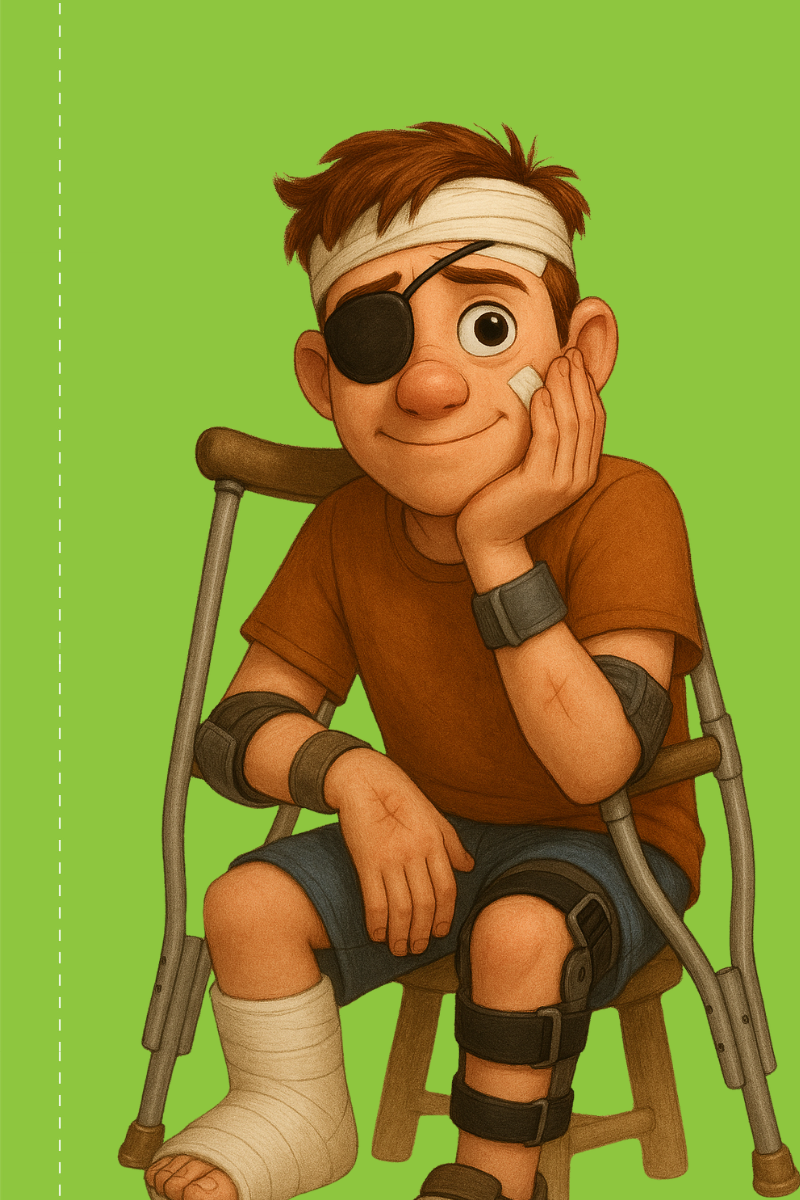The assessment of general damages in personal injury claims is often complex, particularly when a Claimant sustains multiple injuries. The introduction of the Personal Injuries Guidelines (PIGs) in 2021 replaced the Book of Quantum and provided a standard reference for awards in Ireland. Challenges remain however in ensuring that compensation is fair, proportionate, and reflective of all injuries, especially when assessing the uplift for multiple injuries under the Personal Injuries Guidelines or where such injuries overlap.
As outlined in McHugh v Ferol:
“The guidelines do not provide advice as to the process a court should undertake when assessing the ‘uplift’ to ensure that the Claimant is fairly and justly compensated for all the additional pain, discomfort and limitations arising from their lesser injury/injuries.”
This article seeks to provide a detailed, practice-oriented guide to the calculation of the “uplift,” that is, the additional compensation applied to a dominant injury to account for lesser, secondary injuries.
The links at the end of the article will also assist as a quick reference guide for the various cases.
Proportionality in Assessing Multiple Injuries Using the Personal Injuries Guidelines
The Personal Injuries Guidelines provide bands of general damages for specific physical and psychological injuries, offering a reference point for courts in making awards and solicitors and insurers when negotiating settlements.
The Guidelines give immensely helpful award ranges for individual injuries, but things become more complicated when an injured Claimant has several injuries. In those cases, adding the awards for each site of injury together rarely works and often leads to an inflated award, especially where the injuries overlap.
This would be unfair to the Defendant and disproportionate when compared with other awards. The Guidelines make it clear that above all else, the key principle in assessing multiple injuries is one of proportionality. It requires a holistic assessment of the overall impact, usually achieved by applying a global discount to reflect overlapping effects.
In Meehan v Shawcove the Court of Appeal made clear that any award must be proportionate to the maximum award in the most serious cases; that is €500,000, and it must also be proportionate in the context of other awards.
The approach, according to the Guidelines, is to;
“identify the injury and the bracket of damages within the Guidelines that best resembles the most significant of the Claimant’s injuries. The trial judge should then value that injury and thereafter uplift the value to ensure that the Claimant is fairly and justly compensated for all of the additional pain, discomfort and limitations arising from their lesser injury/injuries.”
Identifying the Dominant Injury
Case law consistently confirms that in any case the most significant of the Claimant’s injuries, known as the ‘dominant injury‘ is the starting point for damages assessment in multiple injury cases.
- Collins v Parm [2024] IECA 150 – A psychiatric injury was identified as dominant.
- Dean Keogh v Maria Byrne [2024] IEHC 19 – Coffey J. assessed the “severely displaced and angulated fracture to the shaft of the radius and ulna” as the dominant injury and classified this as being at the lower end of the second tier of the severe category. He assigned to this injury a value of €55,000 (he included in this assessment the permanence of substantial cosmetic disfigurement of the forearm by unsightly scars and a very noticeable soft tissue mass).
Assessing Secondary Injuries and a Reality Check
In a case involving multiple injuries the Court should, having first assessed the dominant injury, then look at the other injuries.
Each injury should be categorised according to the relevant Guideline bracket and thereafter a gross award should be calculated.
Once a gross award is calculated an overlap discount and reduction in value should be applied to the secondary injuries.
Finally a ‘step back‘ and ‘reality check‘ is needed to assess proportionality to ensure that the overall award for general damages is fair and reasonable to all parties and how the overall award fares when compared with other categories in the guidelines.
Lacey Solicitors Six-Step Assessment of the ‘Uplift’
Whilst various decisions can assist, courts in Ireland recognise that, although there are different ways to adjust awards, the specific method is less important than ensuring the final sum fairly reflects the total impact of multiple injuries.
Whilst a simple two stage process has been referenced in the past, the more structured six step process below has its benefits. The following approach illustrates how solicitors and insurers can apply a structured method for multiple injuries:
Step 1: Identify & Assess the Dominant Injury
- Determine the most significant injury and assign a value from the Guidelines is the first step in Assessing the uplift for multiple injuries under the Personal Injuries Guidelines.
- Consider both physical and psychological effects.
- Factor in any risk of future complications, distinguishing risk from probability.
Example: In Dean Keogh, the right forearm injury was valued at €55,000, reflecting functional impairment and potential future complications.
Step 2: Identify & Apply Guideline Values to Secondary Injuries
- Assign each lesser injury a Guidelines bracket value.
- Include all sites of injuries such as scarring, soft tissue injuries, minor psychological injuries, or other residual effects.
Example: In Collins v Parm, back and neck injuries were €15,000, dental injury €5,000, tinnitus €3,000, minor scarring €5,000.
Step 3: Apply a Discount for Overlap
- Recognise that injuries from the same incident often overlap in pain, treatment, and recovery.
- Courts generally apply a 25% to 33% discount, adjusted according to the degree of overlap.
- This ensures the uplift is proportionate and avoids over-compensation.
- Where there is no apparent “most significant” injury, the court in Collins v. Parm [2024] IECA 150 advised that a lower level of discount will apply than would be applied to the aggregated “lesser injuries” in cases where there is an apparent “most significant” injury.
Example: In Dean Keogh, secondary injuries totaling €45,000 were discounted by €15,000, resulting in a net uplift of €30,000.
Step 4: Calculate the Total Uplift for Secondary Injuries
- Total up the secondary injuries after they have been discounted.
Step 5: Calculate the Total Figure for both Dominant & Secondary Injuries
- Add the gross value for secondary injuries after discount to the initial dominant injury value.
Step 6: Conduct a “Reality Check”
- Review the total award against Guideline maxima and comparable cases when Assessing Uplift for Multiple Injuries under the Personal Injuries Guidelines.
- Ensure the sum is justifiable and consistent with awards for similarly severe injuries.
- Make further adjustments if anomalies appear.
Example: In Collins v. Parm in valuing the Claimant’s dominant injury at €35,000, the Court of Appeal then combined the value of Claimant’s lesser injuries at €30,000, before applying a one third deduction to that figure in view of the temporal overlap. The Court of Appeal therefore totalled the Claimant’s award for general damages at €55,000, reducing the High Court award for general damages by 42%, prior to making a further undisputed discount of 15% for contributory negligence.
Practical Example of How the ‘Uplift’ Might be Calculated
| Injury Type |
Dominant / Secondary |
Guideline Value (€) |
Discount Applied |
Net Value (€) |
| Moderate Psychiatric Injury |
Dominant |
35,000 |
N/A |
35,000 |
| Back & Neck Injuries |
Secondary |
15,000 |
33% |
10,000 |
| Dental Injury |
Secondary |
5,000 |
33% |
3,350 |
| Tinnitus |
Secondary |
3,000 |
33% |
2,000 |
| Minor Scarring |
Secondary |
5,000 |
33% |
3,350 |
| Total Uplift (Secondary Injuries) |
|
|
|
18,700 |
| Total General Damages |
|
|
|
53,700 |
| Reality check (proportion & comparators) |
|
|
|
See note below |
Reality-check in Assessing Uplift for Multiple Injuries under the Personal Injuries Guidelines (brief)
- A ‘reality check’ of the kind already mentioned, might be looking at some injuries that, under the Guidelines, attract an award at this level to ensure proportionalty. This was explored in Zaganczyk v John Pettit Wexford Unlimited Company & Anor.
Comparison of the Uplift in Recent Multiple Injury Cases
| Case |
Dominant Injury |
Dominant Injury Award |
Secondary / Non-Dominant Injuries |
Uplift |
Uplift % |
Total General Damages |
| Lipinski v Whelan [2022] |
Moderate PTSD |
€35,000 |
Scarring |
€25,000 |
c. 70% |
€60,000 |
| Rocha |
Wrist |
€40,000 |
Clavicle, scarring, psychological |
€35,000 |
c. 87% |
€75,000 |
| McDonnell |
Rotator Cuff |
€55,000 |
Psychological |
€20,000 |
c. 36% |
€75,000 |
| Broderick |
Ankle Fracture |
€65,000 |
Psychiatric |
€30,000 |
c. 46% |
€95,000 |
| McHugh v Ferol [2023] IEHC 132 |
Serious Foot |
€60,000 |
PTSD, neck, back, hips |
€32,500 |
c. 54% |
€92,500 |
| Power v Malone [2023] |
Facial Scarring |
€60,000 |
Bruising & minor abrasion to left shin |
€30,000 |
– |
€90,000 |
| Zaganczyk v John Pettit [2023] IECA 223 |
Moderate PTSD |
€35,000 |
Scarring |
€25,000 |
c. 71% |
€60,000 |
| Keogh v Byrne [2024] IEHC 19 |
Left Forearm |
€55,000 |
Hip & back injuries |
€30,000 |
– |
€85,000 |
| Coughlan v CGR Construction Ltd [2024] IECA 78 |
Rotator Cuff |
€75,000 |
Headaches |
€30,000 |
c. 40% |
€105,000 |
| O’Sullivan v Ryan [2024] IEHC 326 |
Leg Injury |
€70,000 |
Chest, back, PTSD |
€53,500 |
– |
€123,500 |
| Collins v Parm [2024] IECA 150 |
Moderate PTSD |
€35,000 |
Soft tissue injury to left wrist |
€20,000 |
– |
€55,000 |
| Crum v MIBI [2023] IEHC 656 |
Wrist Fracture |
€45,000 |
Scar, soft tissue, psychological |
€21,000 |
c. 47% |
€66,000 |
Observation: Uplift may exceed the value of the dominant injury as outlined in our previous article only in exceptional cases, but courts always test awards against proportionality.
Lacey Solicitors Guidance to Insurers Assessing Uplift for Multiple Injuries under the Personal Injuries Guidelines
When assessing personal injury awards, practitioners should be cautious about adjusting the final figure based on proposed or unenacted amendments to the Personal Injuries Guidelines. As confirmed in Somers v The Commissioner of An Garda Síochána & Ors [2025] IEHC, proposed changes—including the previously inflation led increase of 16.7% – cannot be applied without formal legislative enactment.
Additionally, it remains essential to assess secondary injuries with appropriate discounts for overlap and to step back to review the overall award for proportionality. In Somers, after applying a one-third discount to non-dominant injuries, the Court confirmed that the resulting total award was fair and reasonable, highlighting that the final figure should only be amended where justified by evidence and proportionality principles, not by theoretical or unapproved adjustments.
Zaganczyk v John Pettit Wexford Unlimited Company highlighted the importance of comparing the total award against the values of individual injury categories outlined in the Personal Injuries Guidelines. Where the overall award surpasses that of a more severe injury, this serves as a “reality check”, prompting a reassessment to ensure the final figure remains proportionate.
Conclusions and Case Law [Updated September 2025]
Following the above step-by-step guide with reference to relevant cases should assist practitioners and insurers in arriving at awards that are fair, defensible, and aligned with current practice but as always, reference should be made to the existing case law on the subject.

















